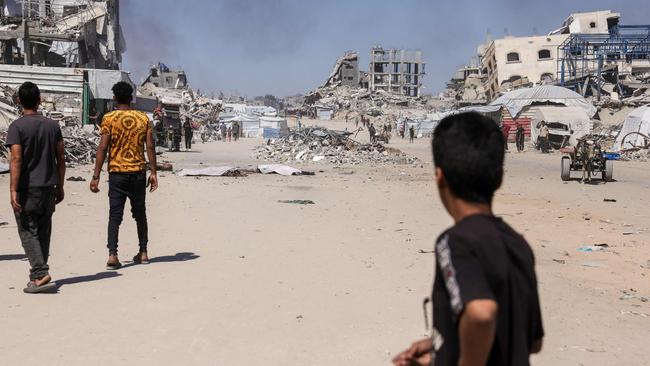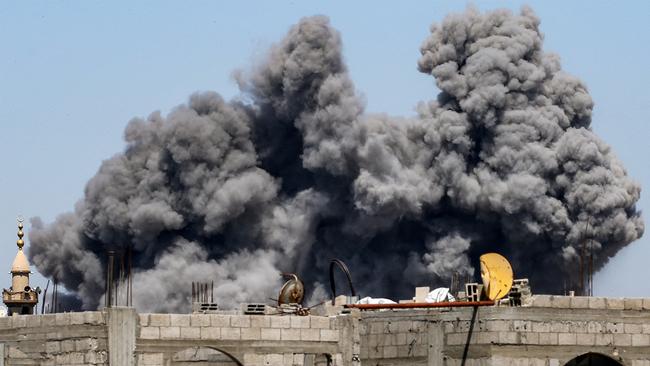Nine children killed by Israeli strikes on Gaza doctors’ home
An Israeli air strike hit the home of a pair of married doctors and killed nine of their 10 children. One child survived.

An Israeli air strike hit the home of a pair of married doctors in Gaza on Friday (local time) and killed nine of their 10 children.
Dr Alaa al-Najjar, a pediatrician in the Nasser Medical Complex, was at work when the strike hit her home in the Qizan Al-Najjar area, south of Khan Younis.
One child and her husband survived, but were severely injured and in intensive care. The youngest child killed in the attack, Sidar, was less than 12 months old.
The mother of ten had left home early that morning to work with her husband, who is also a doctor at the Nasser, driving her to work.
Just minutes after he returned home, a missile struck their house. The eldest of the nine children who died, Yahya, was 12 years old. Their bodies brought into the morgue of the hospital where Al-Najjar works.
Their tenth child, Adam, 11, survived but with critical injuries and remains in hospital.
A video shared by the director of the Hamas-run health ministry shows the bodies of at least seven small children being pulled from the rubble.
An Israeli military spokesman said on Saturday that an aircraft struck “a number of suspects who were identified operating from a structure adjacent to IDF troops” in Khan Younis.
“The area is a dangerous war zone. Before beginning operations there, the IDF evacuated civilians from this area for their own safety. The claim regarding harm to uninvolved civilians is under review,” he added.
On Friday, al-Najjar mourned the loss of her children at a funeral. The mother reportedly collapsed upon seeing the remains of her children brought into the hospital.
At the funeral, she said farewell to her children, who were covered in white sheets placed on gurneys.
Samah al-Najjar is the niece of Hamdi, the husband who was injured in the attack. She told The Sunday Times that on the morning of the strike, she heard “massive and intense” explosions.
“The Israeli forces were all around us,” said Samah, 36, a nutritionist. “While trying to flee the area, we saw that my uncle’s house was completely destroyed. My mother shouted, ‘Hamdi, Hamdi! — screaming and crying. ‘My brother, my brother!’ but there was no response.”
Samah’s sister, Sahar, a pharmacist, said she couldn’t recognise the charred bodies of her cousins. “They were completely burnt,” she said.
Graeme Groom, a British surgeon working in the hospital who operated on al-Najjar’s surviving child, said the incident was “unbearably cruel”.
The 11-year-old boy was “covered in fragment injuries and he had several substantial lacerations,” Groom told the BBC. “His left arm was just about hanging off.”
Groom said the father, who is still in intensive care, “had no political and no military connections. He doesn’t seem to be prominent on social media, and yet his poor wife is the only uninjured one, who has the prospect of losing her husband”.
Victoria Rose, another British doctor working at the hospital, said the Al-Najjar family “lived opposite a petrol station, so I don’t know whether the bomb set off some massive fire.”

She added that this “is life in Gaza. That is the way it goes in Gaza.”
Gazan civil defence teams said the strike completely destroyed their home and sparked an intense blaze.
Dr Muneer Alboursh, the director-general of Gaza’s health ministry, said in a post on social media that this “is the reality our medical staff in Gaza endure. Words fall short in describing the pain.”
He said: “In Gaza, it is not only healthcare workers who are targeted — Israel’s aggression goes further, wiping out entire families.”
On Saturday morning, the IDF said it was investigating “several cases” of soldiers allegedly using Palestinian civilians as human shields in Gaza.
The use of human shields is forbidden by Protocol I of the Geneva Conventions and is considered a war crime. The claims were made by Palestinians as well as Israeli soldiers.
In one instance reported this week, Ayman Abu Hamdan, a Palestinian, said he was dressed in army fatigues with a camera strapped to his forehead. He claimed to have been forced to search houses and inspect holes in the ground for tunnels for 17 days in northern Gaza last summer.
“The use of Palestinians as human shields, or otherwise coercing them to participate in military operations, is strictly prohibited in IDF orders,” an Israeli military spokesman said in a statement.
“Allegations of conduct that do not comply with these directives and procedures are examined. In several cases, investigations by [Israeli military police] were opened following suspicions involving Palestinians in military missions.”
Israeli officials and other observers have also previously claimed Hamas uses civilians as shields as it embeds itself in communities, hiding fighters in hospitals and schools.
The Times



To join the conversation, please log in. Don't have an account? Register
Join the conversation, you are commenting as Logout